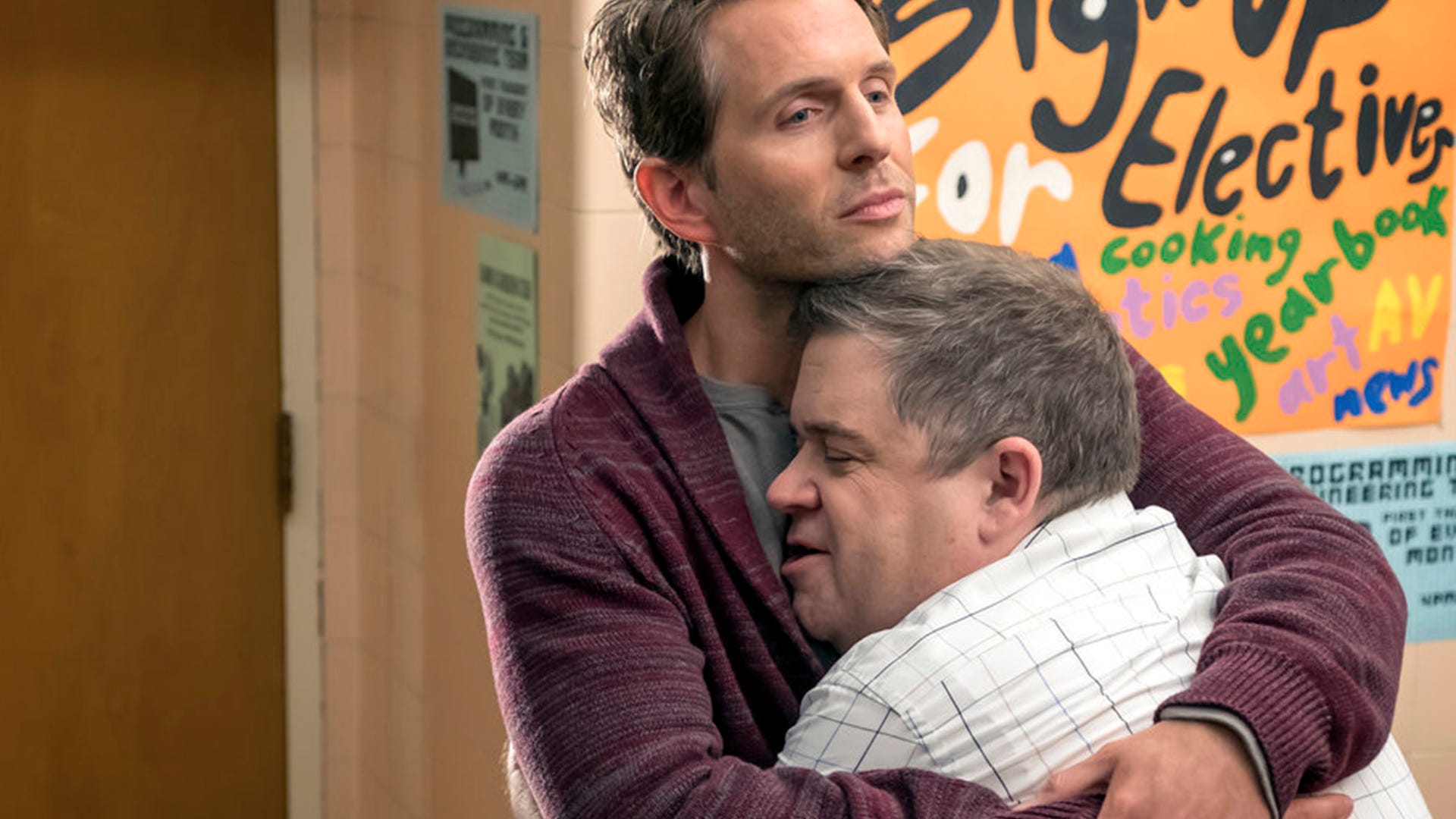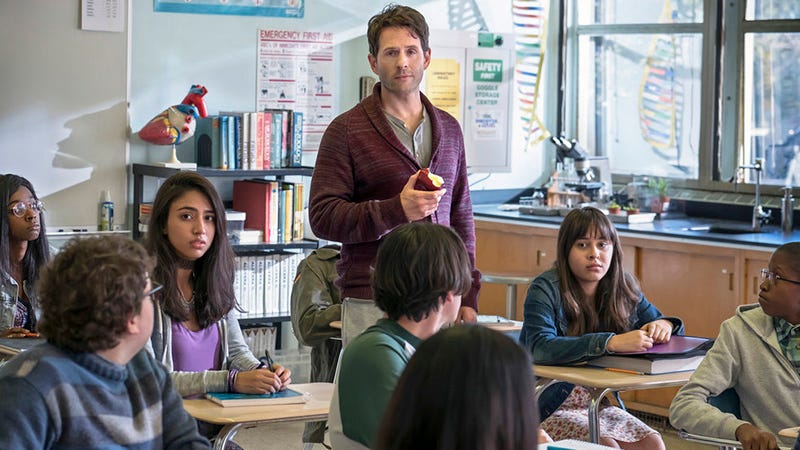Join or Sign In
Sign in to customize your TV listings
By joining TV Guide, you agree to our Terms of Use and acknowledge the data practices in our Privacy Policy.
A.P. Bio Proves That It's Not Always Sunny For NBC Comedies
The overly familiar premise manages to surprise and delight
On paper, a show like A.P. Bioreads like another forgettable network sitcom. Created by Seth Meyers, Mike O'Brien, and Lorne Michaels, A.P. Bio stars Glenn Howerton as Jack Griffin, a disgraced Harvard Philosophy professor who, after an embarrassing display, ends up back home in Toledo, Ohio to reluctantly teach high school advanced placement biology. Jack readily--and frequently--admits that he doesn't want to be there. He's mostly just killing time for a year, only focused on sleeping with "as many women" as he can and also mentally destroying the nemesis who got the Head of Stanford Philosophy job Jack thought was a sure thing. His students aren't a second thought; they're just not a thought at all.
If this sounds familiar, it's probably because you've seen CBS' Bad Teacher (canceled after just three episodes), TV Land's Teachers or truTV's Those Who Can't. There's a million and one versions of a teacher who's been irrevocably changed by his kids, but unlike the shows that came before it, NBC's A.P. Bio needs stand out, because the network has a lot riding on it.
NBC has been on an absolute hot streak with its Thursday night comedy lineup (so much so that it's baffling they refuse to bring back the "Must See TV" moniker), effectively reminding of us of how good--and fresh--the network used to be in its heyday. The current comedy block is certainly impressive: Superstore, which has been one of only three new NBC comedies to get a third season since 2010 (and the only one of those still on air), is a fresh funny look at middle America; Great News, is gaining steadily in ratings while confidently taking up 30 Rock's legacy; the already-renewed Will & Grace revival has remained a steady success and ended the year as the number three comedy; and The Good Place is the best half-hour program currently on television (and is inescapable on Twitter). Sure, This Is Usis seemingly bulletproof but with waning interest in its Chicago-centric franchise, NBC's only brand-building programming block is its slew of powerhouse comedies. A.P. Bio, which has special preview Thursday before going on a month hiatus for the Winter Olympics, is now tasked with keeping this brand-building streak going, especially considering NBC hasn't found heavy-hitting dramas to program around the success of This Is Us.

That month gap might possibly prove to be its undoing, as the pilot episode is mostly as expository as you'd expect, running the risk of its simplicity being confused for mediocrity, and possibly cause viewers to jump ship before it gets interesting. And that's not just because of the familiar and perhaps overly explained premise: After 12 seasons, it's hard to picture Glenn Howerton as anything but Dennis Reynolds from Sunny in Philadelphia, which A.P. Bio leans into. In A.P. Bio previews (critics were provided with the first four episodes), Jack Griffin reads as a lighter version of Dennis--albeit decidedly less sociopathic--watered down for broadcast. But the differences become apparent as the episodes go on, and there are moments when it's clear that A.P. Bio is more cunning than it lets on--just like most of its characters. In one clever meta-moment that comes early in the first episode, Jack explains to his students that he has no plans to actually teach them anything but then clarifies that it isn't going to be like one of those faux-inspirational teacher narratives. He's not going to secretly teach them with lessons hidden in his asshole behavior, nor will he end up actually learning more from them--you know, like every fictional teacher who ends the movie with an overly sentimental monologue. By getting that out of the way quickly, A.P. Bio is free to create and live within its own unique conventions, simultaneously fitting into and reexamining cliched teacher storylines.
That's why it's a shame that viewers have to wait so long to see just how it works against the grain; the pilot is fine, but it's the next three episodes where it begins to lean heavily into its inherent ridiculousness and some ace character explorations. The specifics of that character exploration is what really sets A.P. Bio apart from other teacher shows: It actually includes the students. Rather than just focusing on a group of friendly teachers and their interactions with each other, A.P. Bio is committed to having the teenagers join the fun as well. Instead of mere background characters, the students of Jack's biology class have their own storylines and their own interpersonal relationships that don't involve Jack, but that he does occasionally (and reluctantly) involve himself in. It's why that meta-introduction was so necessary: because we know that's how Jack truly feels about teaching but we also know that there's no way Jack will make it through a whole year of teaching without the students somehow affecting him, and vice versa. The series even finds a natural way to introduce this symbiotic relationship between teacher and student without betraying Jack's established character: He realizes that he can basically make students do his bidding in return for a grade--even if that bidding includes catfishing his nemesis or dating an attractive single mother.

The teens do fall into quick stereotypes of high school students--such as the bullied emo kid Devin (Jacob McCarthy), whom Jack nicknames the "Prince of Darkness," and the overachieving, permanently-serious Sarika (Aparna Brielle) who plots to replace Jack with a teacher who, well, actually teaches--but A.P. Bio allows them to become more than their one-line description, finding surprising nuance and gravity below the surface. In later episodes like "Parent-Teacher" and "Student Council," A.P. Bio really zeroes in on the students and the ways in which these students use Jack just as much as he uses them. But this narrowed focus works both ways: It also allows A.P. Bio to soften Jack's tough exterior, to show that despite all of his perceived coldness, there's definitely someone nicer lurking underneath--though, smartly, A.P. Bio always resists the urge to go full mushy. Showcasing bits and pieces of the students--seeing how obnoxious they can be, learning about their own selfishness and justifiably-immature behavior--helps put Jack's actions and annoyance into perspective. By knowing when to hold back, A.P. Bio strikes a necessary balance. After all, at the end of the day, Jack is still a jerk, and often his way of helping the students is actually a reflection of his own selfishness. Still, it's these warmer moments that also help to Jack apart from Howerton's Sunny character, despite their light similarities. It also showcases Howerton's acting talent; if you look closely, you can see brief moments of sympathy and concern for the students flicker across Jack's face before he shakes them away.
This emphasis on layered characters that break out of their perceived stereotypes helps elevate A.P. Bio from a basic sitcom to the sort of creative, character-driven comedies that NBC is famous for. Not to mention, it's full of laugh-out-loud funny lines and throwaway jokes (the Spanish club consists almost entirely of white students; Principal Durbin explains away a cultural appropriative picture by saying "It was the '90s! It wasn't bad yet!") that keep everything moving along. Though it's promising, A.P. Bio's success still remains up in the air--especially since NBC tends to be trigger-happy with comedy cancellations--because there's not much that makes it feel groundbreaking (like The Good Place) nor does it function as a rapidfire joke factory (like Great News).
Though A.P. Bio still needs to find something to push it above the flock of crowded sitcoms, once it gets going, it's ultimately worth it. The big question, then, becomes whether or not viewers--and NBC--will stick with it long enough.